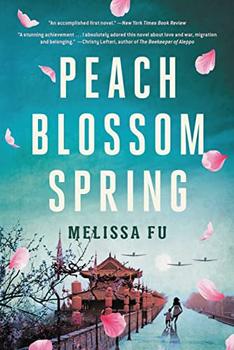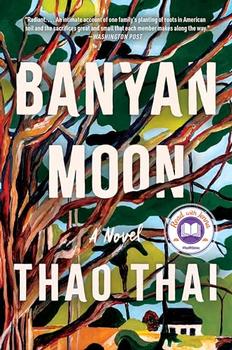Summary | Excerpt | Reading Guide | Discuss | Reviews | Beyond the book | Read-Alikes | Genres & Themes | Author Bio

A Novel
by Melissa FuA "beautifully rendered" novel about war, migration, and the power of telling our stories, Peach Blossom Spring follows three generations of a Chinese family on their search for a place to call home (Georgia Hunter, New York Times bestselling author of We Were the Lucky Ones).
"Within every misfortune there is a blessing and within every blessing, the seeds of misfortune, and so it goes, until the end of time."
It is 1938 in China and, as a young wife, Meilin's future is bright. But with the Japanese army approaching, Meilin and her four year old son, Renshu, are forced to flee their home. Relying on little but their wits and a beautifully illustrated hand scroll, filled with ancient fables that offer solace and wisdom, they must travel through a ravaged country, seeking refuge.
Years later, Renshu has settled in America as Henry Dao. Though his daughter is desperate to understand her heritage, he refuses to talk about his childhood. How can he keep his family safe in this new land when the weight of his history threatens to drag them down? Yet how can Lily learn who she is if she can never know her family's story?
Spanning continents and generations, Peach Blossom Spring is a bold and moving look at the history of modern China, told through the story of one family. It's about the power of our past, the hope for a better future, and the haunting question: What would it mean to finally be home?
Fu not only looks at the historical events, she also examines the consequences and generational impact of the trauma associated with the war, aftermath and political fallout. Sensitive subject matter is carefully handled. The passion the author has for this story is evident in her research and attention to detail (Mitzi K). I absolutely loved this book. Melissa Fu evoked a time and place I am wholly unfamiliar with by using language as delicate and precise as the artistry of the Chinese handscroll that figures so prominently in Meilin's story (Elizabeth VF). I thoroughly enjoyed reading Peach Blossom Spring and will recommend it to my many book-loving friends and members of my book club (Doris K)...continued
Full Review
 (617 words)
(617 words)
(Reviewed by First Impressions Reviewers).
The family at the center of Peach Blossom Spring carries a handscroll with them as they flee their home in the Hunan Province of China during the Second Sino-Japanese War. The scroll illustrates a fable, the significance of which grows and changes for main character Renshu over the course of his life. The handscroll has been a form of art and narrative storytelling in China since the Spring and Autumn period (770-481 BCE). They were initially made with bamboo or wood, but during and after the Eastern Han period (25-220 CE), silk and paper became the predominant materials used. Earlier handscrolls feature ink drawings and writing, but during the Tang Dynasty (618-907 CE), watercolors became the primary medium. Over the years, Chinese ...

If you liked Peach Blossom Spring, try these:

by Randy Ribay
Published 2025
From the author of the National Book Award finalist Patron Saints of Nothing comes an emotionally charged, moving novel about four generations of Filipino American boys grappling with identity, masculinity, and their fraught father-son relationships.

by Thao Thai
Published 2024
A sweeping, evocative debut novel following three generations of Vietnamese American women reeling from the death of their matriarch, revealing the family's inherited burdens, buried secrets, and unlikely love stories.